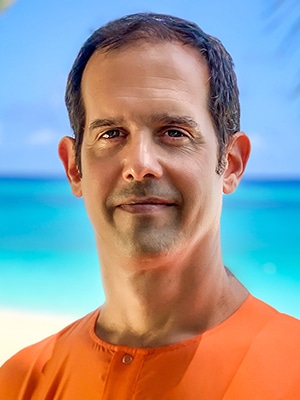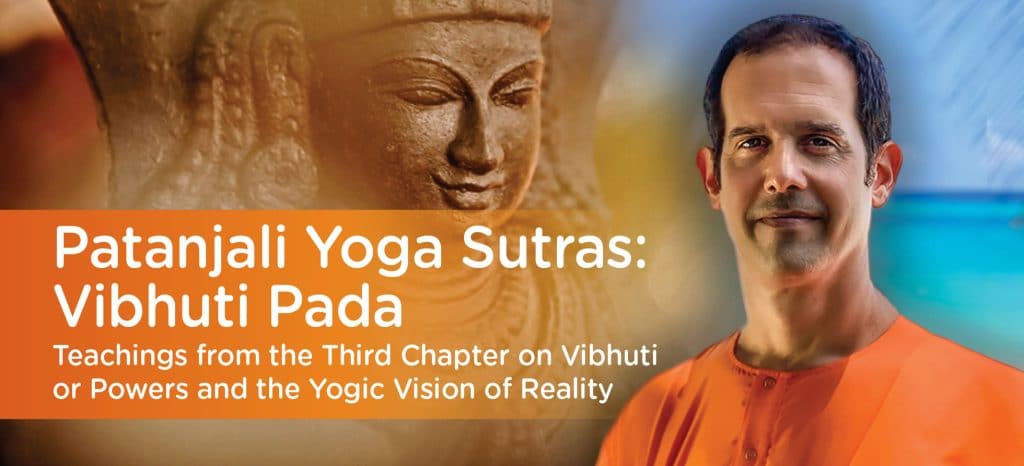- LIVE ONLINE PROGRAM
July 5 – September 20, 2022
Patanjali Yoga Sutras: Vibhuti Pada
Teachings from the third chapter on Vibhuti or Powers and the Yogic Vision of Reality
Swami Brahmananda
12 WEEKLY SESSIONS, Tuesdays, 6:00-7:45pm ET
Course Description:
Learn timeless teachings from the most important text for the yogis, the Patanjali Yoga Sutras. Swami Brahmananda will offer an in-depth study of the third chapter or Vibhuti Pada on the topic of Vibhutis or Powers and the Yogic vision of reality, through a pure and one-pointed mind. The course includes a summary of the first and second chapters – Samadhi Pada and Sadhana Pada.
Join this inspiring course and learn about Yoga as the union of the individual and the Supreme Self brought about by the stilling of the mental waves or Chitta Vrittis, and how one attains Samyama or the application of concentration, meditation and Samadhi or the superconscious state and applies it to gain a true vision of creation (Prakriti) and knowledge of pure consciousness or Purusha.
Raja Yoga, the royal path of mind control, is the most comprehensive and scientific approach to God-Realization. The precepts and doctrines of this ancient science were first compiled and explained by Patanjali Maharishi, the greatest psychologist of all time. Never has the human mind been so completely analyzed. Never has the process of eliminating human suffering been so succinctly presented. The methods of Raja Yoga are profound and timeless. They are the most useful techniques available to modern man beset by the tremendous stresses and strains of our competitive society.
What you will learn:
- Summary of the first chapter or Samadhi Pada.
- Summary of the second chapter or Sadhana Pada.
- An in depth study of the the third chapter or Vibhuti Pada on the topic of Vibhutis or Powers and the Yogic vision of reality, through a pure and one-pointed mind. All the 56 Sutras or verses of the chapter will be covered and explained with traditional commentaries and insights.
- Patanjali Maharishi teaches that the soul, Purusha, has two purposes to accomplish for it to be liberated from suffering, namely, experience (bhoga) and transcendence (apavarga). Experience is the gaining of the knowledge of nature (Prakriti) or creation, whereas transcendence is when Purusha becomes aware of its own nature as pure consciousness. In the first goal, experience, the soul embarks on its quest for happiness in the external world and is suffering the pleasures and pains of life. Gradually the soul shifts to seek freedom from bondage and starts on the path of sadhana, or practice of the Yogic means. As the mind becomes pure and sadhana becomes established, the Yogi enters the path of Samprajnata Samadhi, where deep meditation is applied in order to know creation as it is, and finally transcend it by gaining knowledge of consciousness itself. It is this latter part of the journey of experience, Samprajnata Samadhi, which is taught in the Vibhuti Pada. It describes the Yogic wisdom and insights about creation and the mind.
- Yoga Philosophy – gain a thorough understanding of the teachings of the Patanjali Yoga Sutras by which we attain clear understanding of the nature of the mind and its being different from pure consciousness, freedom from binding emotions, attachments and addictions.
- Yoga Psychology – the Patanjali Yoga Sutras is the most complete teaching on Yoga psychology.
- The process of Yoga - the stilling of the thought waves in the mind lake or Chitta, by which one attains abidance in pure consciousness.
- The five Kleshas - the five roots of human suffering, viz. avidya - ignorance, asmita - egoism, raga - attraction, dvesha - aversion, abhinivesha - fear of death, their definitions and the means of alleviating them.
- Practice and non-attachment (abhyasa and vairagya) – how to cultivate self discipline and regularity in the practice of spiritual disciplines and practical ways to cultivate non-attachment.
- Karma and its workings - Patanjali Maharishi gives a detailed analysis of the operations of karma, the cause of karma, its relation to suffering and how karma manifests in the life of the individual.
- The evolution of the soul - the process of the evolution of the soul, the purposes of evolution and its culmination in spiritual liberation.
- Ashtanga Yoga - the Yoga of eight limbs - the means to alleviate the mental afflictions and attain Samadhi: Yama (restraints), Niyama (observances) and their attainments (siddhis), Asana (postures), Pranayama (regulation of breath), Pratyahara (withdrawal of the senses), Dharana (concentration), Dhyana (meditation), Samadhi (superconscious state)
Additional Information:
Offered as 12 weekly sessions on Tuesdays, Jul 5, 12, 19, 26, Aug 2, 9, 16, 23, 30. Sep 6, 13, 20 6:00-7:45pm ET
This program is offered live through Zoom webinar with the availability for students to interact through Q&A with the presenter.
For enrolled students, a video recording will be available after each class in the event you miss a class or would like to review the content.
It is possible to register and take the course at any time. You can catch up on any classes you miss with the recordings.0
Requirements and Recommendations:
- No experience necessary. This program is open to beginners as well as advanced practitioners.
- Viewing Device: Desktop or laptop computer will provide the best experience, although you can also connect via a tablet or smartphone.
- Internet connection: High-speed broadband wired or wireless is best.
- Video: Download Zoom to your computer, or install the Zoom app to your device. For interactive group sessions, a webcam or integrated camera will allow others to feel more connected with you.
- Audio: Headphone speakers are recommended. If you wish to participate vocally, a headset with a microphone will be ideal.
Course Includes:
- 12 live sessions of study (21 hours) from the Patanjali Yoga sutras and guided practices. Each class includes teachings, practice time and dedicated time for questions and answers
- Recordings of the live sessions
- Course Manual
- Teacher’s availability to reply to questions about the study material between classes

Swami Brahmananda is a monk and senior teacher of the Sivananda Yoga Vedanta Centers and is the current Manager of the Sivananda Ashram Yoga Retreat in the Bahamas. Swami Brahmananda joined the Sivananda organization in 1999 and was initiated into Sannyasa (monasticism) in 2006.
A long-time practitioner of yoga, meditation and philosophical studies, he regularly teaches meditation and yoga philosophy for the Sivananda Yoga Teachers’ Training Courses as well as the Advanced Yoga Teachers’ Training Courses. He also teaches online courses on the Patanjali Yoga Sutras and Vedanta. Swami Brahmananda is a much-loved, inspiring, and knowledgeable teacher.
